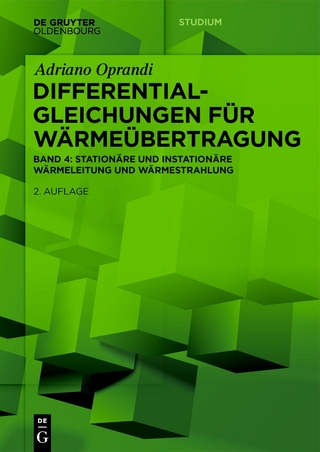Boundary Value Problems and Markov Processes
Springer Berlin (Verlag)
978-3-642-01676-9 (ISBN)
- Titel erscheint in neuer Auflage
- Artikel merken
This volume is devoted to a thorough and accessible exposition on the functional analytic approach to the problem of construction of Markov processes with Ventcel' boundary conditions in probability theory. Analytically, a Markovian particle in a domain of Euclidean space is governed by an integro-differential operator, called a Waldenfels operator, in the interior of the domain, and it obeys a boundary condition, called the Ventcel' boundary condition, on the boundary of the domain. Probabilistically, a Markovian particle moves both by jumps and continuously in the state space and it obeys the Ventcel' boundary condition, which consists of six terms corresponding to the diffusion along the boundary, the absorption phenomenon, the reflection phenomenon, the sticking (or viscosity) phenomenon, the jump phenomenon on the boundary, and the inward jump phenomenon from the boundary. In particular, second-order elliptic differential operators are called diffusion operators and describe analytically strong Markov processes with continuous paths in the state space such as Brownian motion. We observe that second-order elliptic differential operators with smooth coefficients arise naturally in connection with the problem of construction of Markov processes in probability. Since second-order elliptic differential operators are pseudo-differential operators, we can make use of the theory of pseudo-differential operators as in the previous book: Semigroups, boundary value problems and Markov processes (Springer-Verlag, 2004).Our approach here is distinguished by its extensive use of the ideas and techniques characteristic of the recent developments in the theory of partial differential equations. Several recent developments in the theory of singular integrals have made further progress in the study of elliptic boundary value problems and hence in the study of Markov processes possible. The presentation of these new results is the main purpose of this book.
Kazuaki TAIRA is Professor of Mathematics at the University of Tsukuba, Japan, where he has taught since 1998. He received his Bachelor of Science (1969) degree from the University of Tokyo, Japan, and his Master of Science (1972) degree from Tokyo Institute of Technology, Japan, where he served as an Assistant between 1972-1978. He holds the Doctor of Science (1976) degree from the University of Tokyo, and the Doctorat d'Etat (1978) degree from Université de Paris-Sud, France, where he received a French Government Scholarship in 1976-1978. Dr. Taira was also a member of the Institute for Advanced Study, U. S. A., in 1980-1981. He was Associate Professor of the University of Tsukuba between 1981-1995, and Professor of Hiroshima University, Japan, between 1995-1998. His current research interests are in the study of three interrelated subjects in analysis: semigroups, elliptic boundary value problems and Markov processes.
and Main Results.- Semigroup Theory.- L Theory of Pseudo-Differential Operators.- L Approach to Elliptic Boundary Value Problems.- Proof of Theorem 1.1.- A Priori Estimates.- Proof of Theorem 1.2.- Proof of Theorem 1.3 - Part (i).- Proof of Theorem 1.3, Part (ii).- Application to Semilinear Initial-Boundary Value Problems.- Concluding Remarks.
| Erscheint lt. Verlag | 30.6.2009 |
|---|---|
| Reihe/Serie | Lecture Notes in Mathematics ; 1499 |
| Zusatzinfo | XII, 192 p. 41 illus. |
| Verlagsort | Berlin |
| Sprache | englisch |
| Maße | 155 x 235 mm |
| Gewicht | 310 g |
| Themenwelt | Mathematik / Informatik ► Mathematik ► Analysis |
| Mathematik / Informatik ► Mathematik ► Wahrscheinlichkeit / Kombinatorik | |
| Schlagworte | 35J25, 47D05, 47D07, 60J35, 35K60 • Analytic semigroup • Boundary value problem • Elliptic boundary value problem • Feller semigroup • Funktionalanalysis • Markov process • Probability Theory • semilinear parabolic equation |
| ISBN-10 | 3-642-01676-6 / 3642016766 |
| ISBN-13 | 978-3-642-01676-9 / 9783642016769 |
| Zustand | Neuware |
| Informationen gemäß Produktsicherheitsverordnung (GPSR) | |
| Haben Sie eine Frage zum Produkt? |
aus dem Bereich





